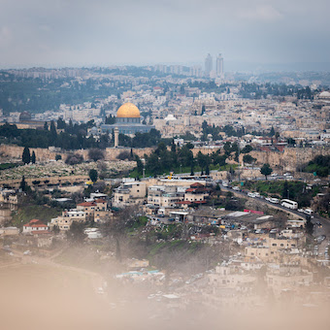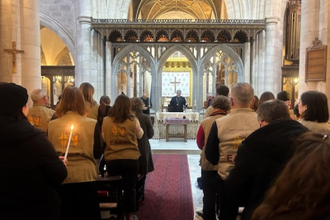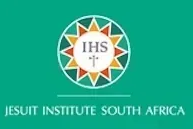WCC alerts 'conscience of the world' to 'obstruction of legitimate Palestinian aspirations' for equal rights

Jerusalem, 2020. Photo: Albin Hillert/LWF
Source: WCC
The World Council of Churches (WCC) executive committee, in a public statement today, has expressed grave concern over recent developments in Palestine and Israel, which indicate "a deteriorating situation in the region, emblematic of the many ways in which the ongoing military occupation of the Palestinian territories obstructs achieving a just peace among the people of the Holy Land, and compounded by the COVID-19 pandemic and responses to it which have resulted in further restrictions on the space for civil society action in the region."
The text continues: "Together with some international civil society organizations, Palestinian civil society has long been targeted by measures which shrink its space to operate."
The statement concludes with the WCC executive committee again calling "the conscience of the world to the unremitting military occupation of the Palestinian territories and the ongoing marginalization and obstruction of legitimate Palestinian aspirations for equal human dignity and rights."
The WCC executive committee is meeting-in-person for the first time in two years-from 12-17 November at the Bossey Ecumenical Institute.
Read the full statement below:
Statement on recent developments in Palestine and Israel
By the WCC Executive Committee, 17 November 2021.
And when he drew near and saw the city, he wept over it, saying, "Would that you, even you, had known on this day the things that make for peace! But now they are hidden from your eyes. (Luke 19, 41-42)
In response to a series of recent developments in Palestine and Israel, heads of churches and partners in the region have raised concerns regarding settlements and settler activities supported by the authorities inside the Old City at holy sites, changes in the Status Quo, threats to the multi-religious identity of Jerusalem, displacement of Palestinians from their homes, and restriction of cultural activities by Palestinian communities.
These developments indicate a deteriorating situation in the region, and are emblematic of the many ways in which the ongoing military occupation of the Palestinian territories obstructs achieving a just peace among the people of the Holy Land, and compounded by the COVID-19 pandemic and responses to it which have resulted in further restrictions on the space for civil society action in the region.
'Terrorist' designation of Palestinian human rights organizations
Together with some international civil society organizations, Palestinian civil society has long been targeted by measures which shrink its space to operate. Most recently, the Israeli Defence Minister designated six Palestinian human rights and civil society groups - including organizations working for the rights of children and of women - as terrorist organizations, despite no evidence having been adduced to justify this action. Most Israeli human rights organizations condemned the move.
This unsubstantiated designation is an attack on the Palestinian human rights movement and human rights everywhere. Silencing these voices is incompatible with principles of democracy, human rights and international humanitarian law. Anti-terrorism legislation must not be used to undermine civil liberties or curtail human rights organizations' legitimate work.
Jewish settlements in occupied West Bank, and forced displacement of Palestinians in Jerusalem
In another concerning development, the Israeli authorities have advanced plans for more than 3,100 new homes in Jewish settlements in the occupied West Bank. A planning committee gave its final approval for 1,800 housing units and preliminary approval for 1,344 more. This expansion is contrary to international law and the fourth Geneva Convention, and further undermines hopes for an end to the occupation and a just and peaceful future for both peoples.
In addition, approximately 300 Palestinian residents in 28 families continue to be threatened with eviction and forced displacement from their homes in the Sheikh Jarrah neighbourhood of East Jerusalem, where they lived since 1956 pursuant to an agreement between the United Nations Relief and Work Agency (UNRWA) and the Hashemite Kingdom of Jordan.
Olive harvest attacks
The olive harvest season is always difficult for many Palestinian families, as they often suffer from harassment and vandalism by Israeli settlers. To date, with the olive harvest still ongoing, there have been 28 recorded incidents this harvest season. A total of 1415 trees have been damaged or destroyed and hundreds of kilograms of olives stolen. In one notable violent incident, Israeli settlers assaulted Palestinian community members from Awarta and Rabbis for Human Rights volunteers with pepper spray canisters.
Closure of church events
An additional measure contributing to the shrinking space for civil society was the Israeli Public Security Minister's decision to shut a church cultural event in East Jerusalem. The event aimed to improve the psychosocial well-being of Palestinian children and improve their coping mechanisms. The Minister sought to justify this action on the grounds that the Palestinian Authority funds these events, which the organizers deny, and no evidence has been provided to support the claim.
The Ecumenical Accompaniment Programme in Palestine & Israel (EAPPI) and COVID-19
During the absence of international visitors, pilgrims and Ecumenical Accompaniers, settler attacks in the West Bank have significantly increased. According to UN partners, EAPPI has been the only consistent international protective presence in the West Bank. Until the COVID-19 pandemic, EAPPI had the largest number of observers on the ground among all the international organizations working in Palestine and Israel. With Israel having recently re-opened its borders, the return of international Ecumenical Accompaniers is now being planned.
We also pray for and encourage an increase in the number of pilgrims and visitors to the Holy Land, to serve as Christian witnesses and to improve the Palestinian economy to help the people to stay steadfast and prosper after two years of economic crisis.
Praying and acting for a just peace in the Holy Land
The executive committee of the World Council of Churches, meeting in Bossey, Switzerland, on 12-17 November 2021, again calls the conscience of the world to the unremitting military occupation of the Palestinian territories and the ongoing marginalization and obstruction of legitimate Palestinian aspirations for equal human dignity and rights. A just and sustainable peace in the Holy Land cannot be built by violence and injustice. We call again for all Christians and all people of good will to pray and act to keep hope alive for peace, justice, dignity and rights for Palestinians and Israelis alike, and for a peaceful solution to the situation in the region in accordance with international law.


















